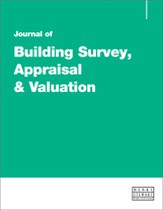Landlords and tenants must work together to meet net zero carbon targets
Abstract
Almost one-third of the UK’s total emissions relate to the energy used in existing buildings. This paper discusses how it is clear that improvements in the energy efficiency performance of buildings (and the way in which occupiers use them) are absolutely central to the UK Government’s 2050 net zero carbon emissions target. It anaylyses how some of the impetus towards driving down operational energy usage is statute-led (such as the Streamlined Energy and Carbon Reporting [SERC] regulations) but so too is the upshift in emand for greener buildings from occupiers and investors. The paper dicusses the numerous ways in which improvements can be made to a building and its services that may well improve its energy performance certificate (EPC), but also argues that it is vitally important to educate occupiers on ways in which their actions can have a huge impact on the building’s in-use performance. The paper discusses a significant hurdle to implementing energy efficiency improvements: currently, most commercial leases do not adequately address the issues involved, including often highly contentious areas such as consent for alterations, whether it is the landlord or the tenant that pays, and whether or not changes need to be reinstated at lease end. The paper analyses ways to address this: by moving the way in which leases are drafted towards the green lease model, such as that set out in the Better Building Partnership Green Lease Toolkit. Such leases include clauses which provide for environmental performance improvements, management and monitoring as well as the way reinstatement at least end is dealt with. In the paper concludes that, alongside implementing physical energy efficiency improvements, monitoring energy use and educating building users, landlords and tenants must forge a new, collaborative approach in order to reach net zero by 2050.
The full article is available to subscribers to the journal.
Author's Biography
Anne Johnstone is a Partner at Malcolm Hollis, Glasgow with responsibility at a national level for the environmental service. Anne has experience in a broad range of environmental specialisms including due diligence, contaminated land investigation and risk assessment, remediation, environmental permitting and ecosystem services assessment. She has also provided expert witness services to clients in relation to contaminated land liabilities. Anne’s clients include top UK pension funds, private equity firms, corporations and public sector bodies. She is a member of the Investment Property Forum and Chair of the UK Environmental Law Association (UKELA).
Clare Holyoake is an associate at Hollis. She has experience across all areas of building surveying but oversees the landlord and tenant services in Edinburgh. Clare has dealt with end-of-term, interim and break clause dilapidations instructions for a variety of clients across all sectors, including industrial, retail and office premises.
Citation
Johnstone, Anne and Holyoake, Clare (2020, September 1). Landlords and tenants must work together to meet net zero carbon targets. In the Journal of Building Survey, Appraisal & Valuation, Volume 9, Issue 2. https://doi.org/10.69554/FXXK3007.Publications LLP
